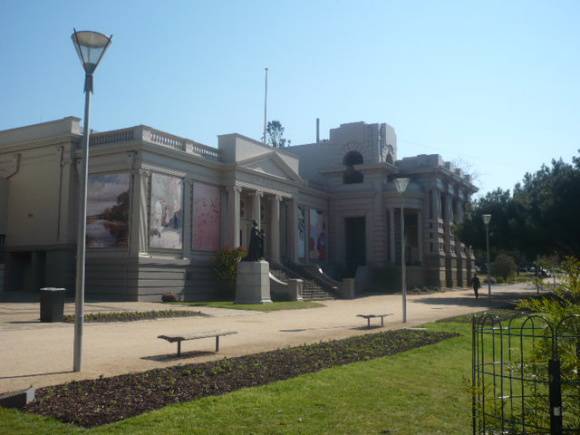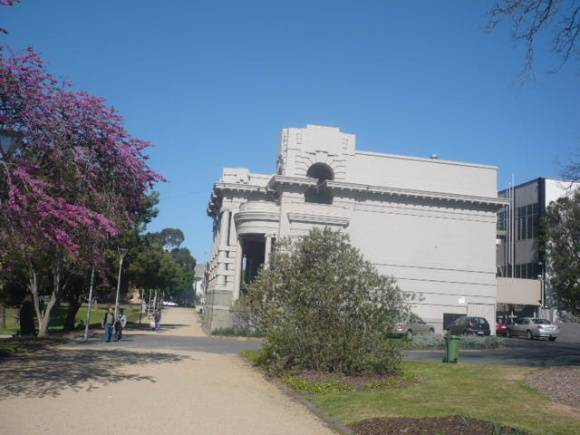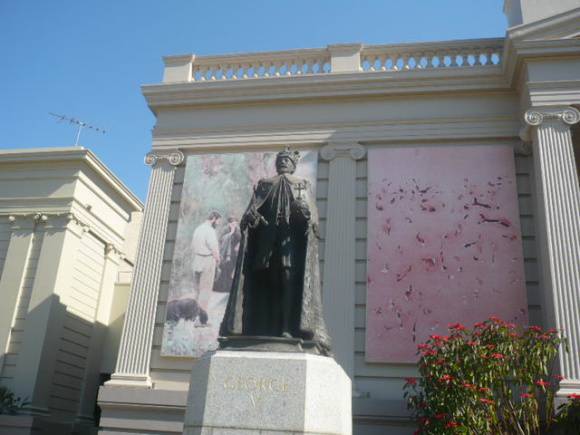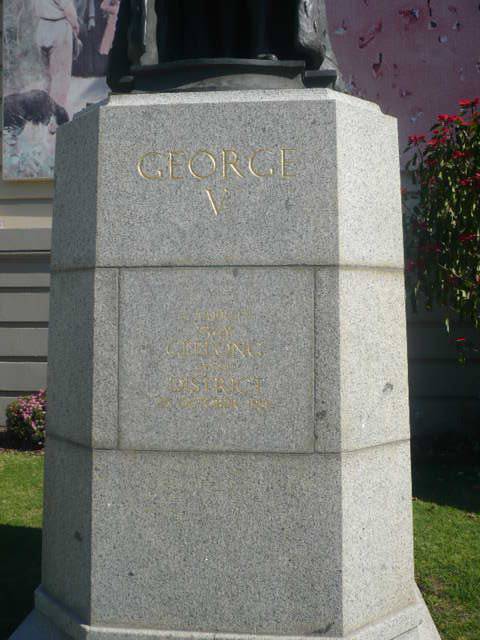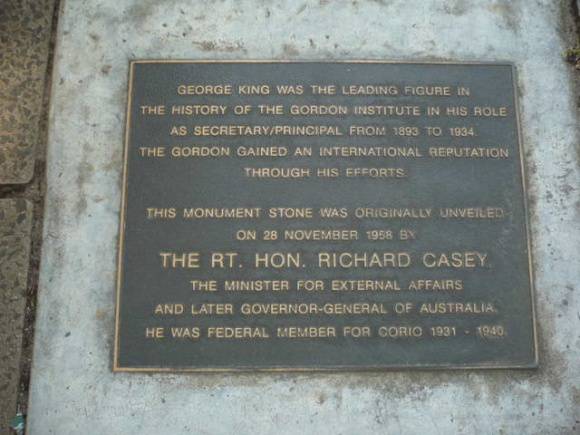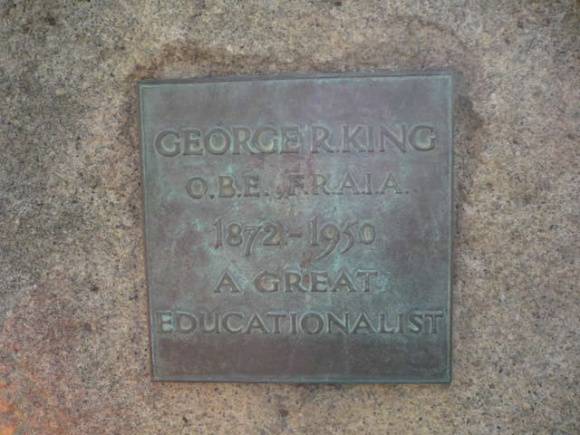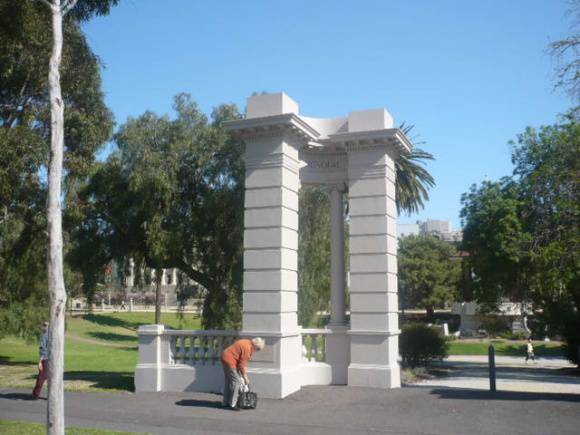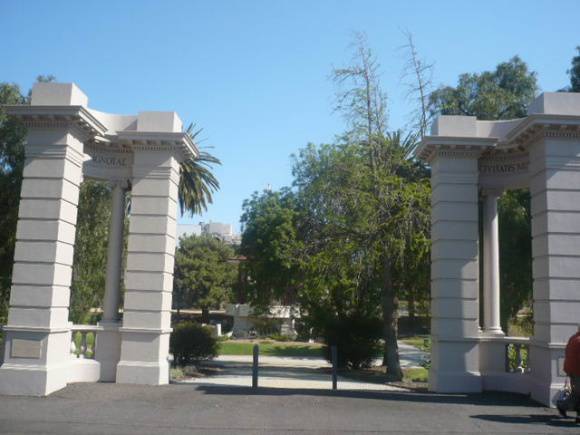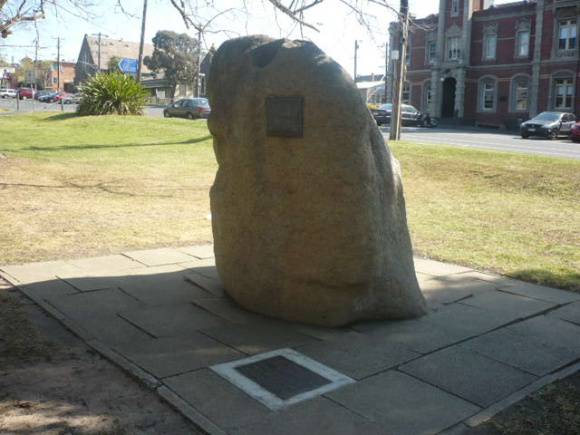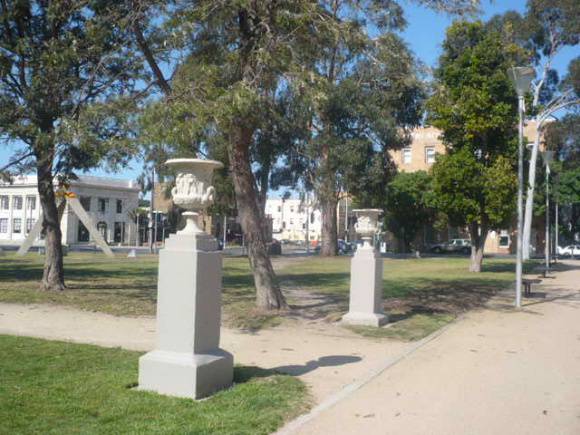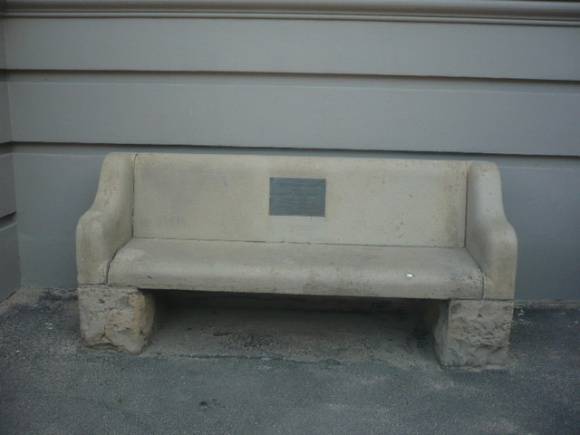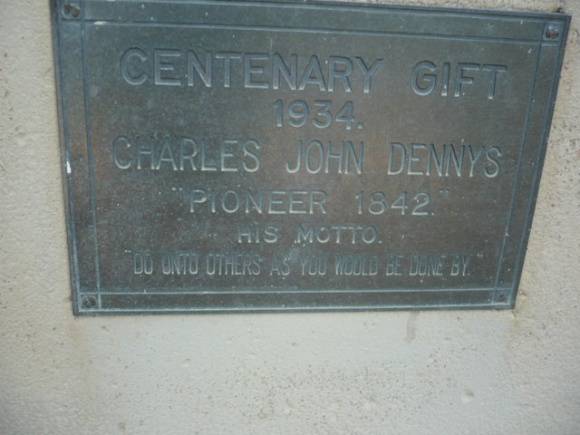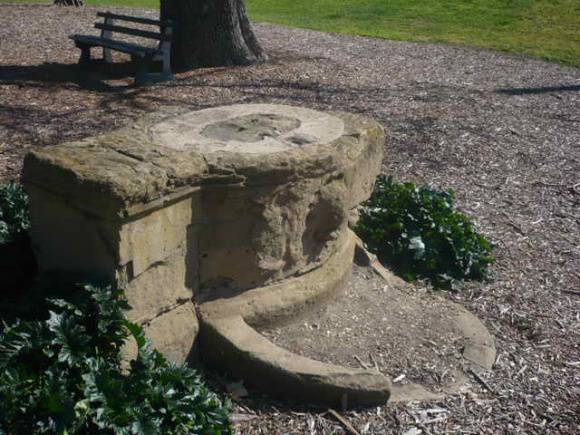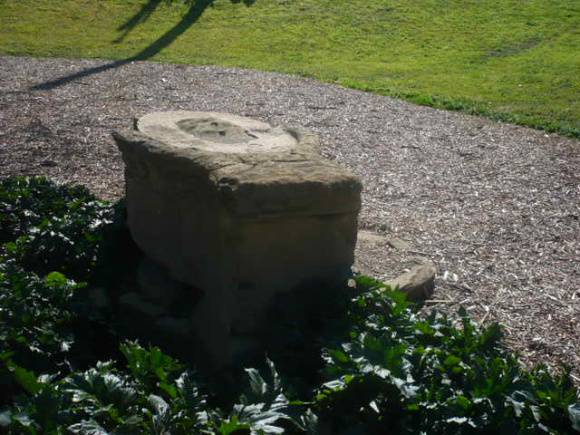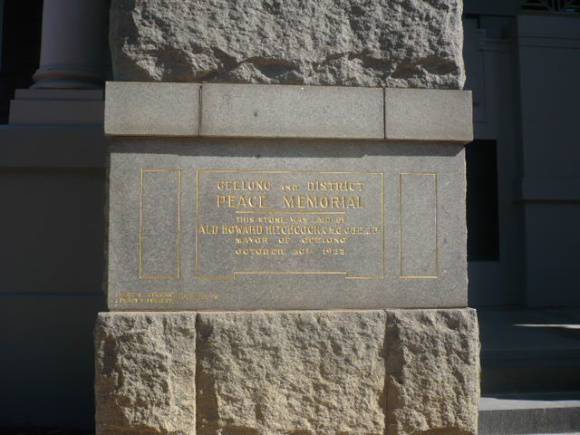| Back to search results » | Back to search page » |
|
Johnstone Park Buildings & Objects - Bandstand, George King Stone, Hitchcock Memorial Gates, King George V Statue, Medici Urns, Stitt Jenkins Memorial Fountain, 24 Gheringhap Street
Statement of Significance
A Listed - State Significance STATEMENT OF SIGNIFICANCE - GRC - HISTORIC PLACES DOCUMENTATION SHEET NO. 230 STITT JENKINS MEMORIAL FOUNDATION The Barrabool stone components of the William Stitt Jenkins Dog Fountain are the surviving remnants of a once elaborate drinking fountain built in 1860 and specifically for the use of animals. Originally located at the intersection of Railway Terrace and Mercer Street, and subsequently moved to the Market Square in 1879, this fountain was erected under the auspices of prominent Geelong settler and businessman, William Stitt Jenkins. Jenkins was the founder of a local movement to provide drinking fountains and water troughs' at strategic location in Geelong for the use of quadrupeds. The fountain of a semi-circular troughs', is modeled on Classical prototypes by the Architects Backhouse & Reynolds. RECOMMENDATIONS: PROTECTIVE MEASURES Geelong Regional Commission Register. REFERENCES For brief details of Eilliam Stitt Jenkins see Brownhill, W. R. - A History of Geelong and Corio Bay, Wilke & Co., Melbourne, 1955, pp. 208, 219, 245-247, 392, 414, 594, 452 photographs. William Stitt Jenkins died on 1 August, 1878, and is buried in the Eastern Cemetery. He was born in England on 30 June, 1812, and came to Victoria in the early 1850's. Jenkins established a reputation as a local poet and contributed regularly to the Geelong Advertiser. His Last Will and Testament was written in verse. A search of Minute books and records of the City of Greater Geelong, and a detailed examination of the Geelong Advertiser for 1860 may unearth further information concerning the dedication of the fountain and the monumental mason responsible for the execution of this once finely detailed drinking fountain Geelong Advertiser - 31 December 1859: 'Tenders to stonemasons for erection of a public drinking fountain corner Moorabool and Malop Streets. Backhouse and Reynolds Architects. "A History of Johnstone Park and Its Buildings" P Mills, R Geisberg, B Sharp: Unpublished Report, Architectural Department, University of Melbourne.
STATEMENT OF SIGNIFICANCE - GRC - HISTORIC PLACES DOCUMENTATION SHEET NO. 228 KING GEORGE V STATUE The bronze statue of King George V which stands on a granite base in front of the Art Gallery and facing Johnstone Park was unveiled by the Governor of Victoria on 26 October, 1938, as a tribute from the people of Geelong and District to their late king. The bronze figure was canst in 1937 at the Fonderie Chivrazzi in Naples, Italy, to design by the Sculptor, Wallace Anderson. The statue is a fine example of commemorative statuary in Australia and witness to the strong patriotic spirit in the Geelong region. RECOMMENDATIONS: PROTECTIVE MEASURES Geelong Regional Commission Register. REFERENCES The unveiling ceremony on 26 October 1938 is recorded in the files of the Geelong Advertiser and in Geelong 1938 Centenary Illustrated Geelong Advertiser 1938. p. 7. Geelong advertiser - 27 October, 1938, p. 1. description of ceremony. STATEMENT OF SIGNIFICANCE - GRC - HISTORIC PLACES DOCUMENTATION SHEET NO. 226 G. R. KING MEMORIAL STONE The King Monument at western boundary of Johnstone park, and close to the Gordon technical College (established 1887) commemorates the contribution of noted architect, administrator and educationalist, George R King to the cultural and educationalist, George R. King to the cultural and educational life of Geelong. From 1898 to 1934, King served the Gordon technical Colleges Secretary, and later, Principal with great distinction. The granite boulder from the Dog Rocks at Batesford was erected in 1959 by ex-students of the Geelong Technical College, symbolising King;s love of the area and the dramatic Dog Rocks formation. RECOMMENDATIONS: PROTECTIVE MEASURES Geelong Regional Commission Register. REFERENCES Mills p., Geisberg R., and Sharp, B, - "A History of Johnstone Park and its Buildings' History IV thesis, Department of Architecture, University of Melbourne, 1965. Brownhill, W. R. - A History of Geelong and Corio Bay, Wilke & Co., Melbourne, 1955, pp. 253-254. Aitken, Richard - "Edwardian Geelong: An Architectural Introduction", Deakin University, 1979, for details of the architectural practice of Seeley, King and Everett. Sillcock, Ken M - 'The Gordon of Geelong: A History of the Gordon Institute of technology 1887-1980'. Unpublished manuscript copy at the Gordon Technical College, Geelong. Inscription on the monument reads: 'George R King, O.B.E., F.R.A.I.A., 1872-1950 A Great Educationalist'
STATEMENT OF SIGNIFICANCE - GRC - HISTORIC PLACES DOCUMENTATION SHEET NO. 227 HITCHCOCK MEMORIAL GATEWAY The Hitchock Memorial gateway to the northern approach of the Johnstone Park was erected in 1925 as a tribute to noted civic leader, the hon. Howard Hitchcock, Mayor of Geelong in 1917-1922. the conservative classical design by architects Laird and Buchan is derived from the architecture of the English Renaissance and is located on the axis of the Peace Memorial building and the central bandstand to for an impressive entrance to the spacious Jonhston Park gardens. RECOMMENDATIONS: PROTECTIVE MEASURES Geelong Regional Commission Register. REFERENCES Mills, P - Geisebers R and Sharp, b. - 'A history of Johnstone Park and Its Buildings, History Research Essay, Department of Architecture, university of Melbourne, 1965. STATEMENT OF SIGNIFICANCE - GRC - HISTORIC PLACES DOCUMENTATION SHEET NO. 229 DE MEDICI URNS The 'De Medici' Urns in Johnstone Park were presented to the Corporation of the City of Geelong by Mrs John bell in October 1873. These two cast iron urns, modelled on urns from the period of the Florentine Italian Renaissance were made at the Derby Works of enterprising and accomplished iron founders, Andrew Handyside & Co. This firm was known for their superior castings of fine vases, fountains and ornamental castings and these two urns together with four others at Corio Villa are exquisite examples of Handyside craft. The urns have historical associations with the foundation of Johnstone Park and are of great technical and aesthetic interest. RECOMMENDATIONS: PROTECTIVE MEASURES Geelong Regional Commission Register. Historic Buildings Council Register National Trust of Australia (Victoria) Register. Australian Heritage Commission Register of the National Estate REFERENCES For details of the work of Andrew Handyside and Company see Gilbert , Herbert - Pioneers of Prefabrication: The British Contribution in the Nineteenth Century, Baltimore, 1976. Andrew Handyside and Company - Works in Iron, Spon, London 1868. Malcom Higgs - The Exported Iron Buildings of Andrew Handyside and Company of Derby in Journal of the Society of Architectural Historians, XXIV, May, 1970. pp. 175-180 For details of the gift of the 'De Medici' Urns by Mrs John Bell see: Geelong Advertiser - 24 October, 1873 P. 2, 5 November, 1873 p.2, 6 November, 1873, p.2. For special general history of the development of Johnstone park see: P Mills, R Geisbers and B Sharp - 'A History of Johnstone Park and Its Buildings' Department of Architecture, University of Melbourne 1965. HISTORY - City of Geelong West - Urban Conservation Study - Building Identification Form 225 BANDSTAND The Bandstand in Johnston Park was erected in 1919 in a Beaux Arts Style design by distinguished Geelong architect Percy Everett, and in memory of the mother of Howard Hitchcock, Mayor of Geelong and endower of the structure - Located on the axis of the Peace Memorial building adjacent, this exquisitely detailed bandstand from the council focus of the Johnston Park gardens. The Bandstand with the elaborate pavilion roof and ornamented platform is one of the finest structures of this type in Victoria and a significant early work of Everett, later chief architect of the Public Works Department. RECOMMENDATIONS: PROTECTIVE MEASURES Geelong Regional Commission Register. Historic Buildings Council Register. REFERENCES Mills, P , Giesbers R & Sharp B., 'History of Johnston Park and its Buildings', History research Essay, Department of Architecture, University of Melbourne, 1965. Aitken, Richard - "Edwardian Geelong: An Architectural Introduction", History Research Essay Department of Architecture, Deakin University, Geelong, 1979. Note: A copy of Mills, Giesbers & Sharp Essay is available at the Geelong Historical Records Centre, Lt. Malop Street. HISTORY - City of Geelong West - Urban Conservation Study - Building Identification Form 230 STITT JENKINS MEMORIAL FOUNTAIN STYLE OF PERIOD: ARCHITECT(S)/DESIGN DATES OF CONSTRUCTION: ESTIMATED CONTRACT VALUE: SUBSEQUENT WORKS/ALTERATIONS/ADDITIONS: ORIGINAL OWNERS/OCCUPANTS: OTHER NOTES: HISTORY - City of Geelong West - Urban Conservation Study - Building Identification Form 228 KING GEORGE V STATUE STYLE OF PERIOD: ARCHITECT(S)/DESIGN DATES OF CONSTRUCTION: ESTIMATED CONTRACT VALUE: SUBSEQUENT WORKS/ALTERATIONS/ADDITIONS: ORIGINAL OWNERS/OCCUPANTS: OTHER NOTES: HISTORY - City of Geelong West - Urban Conservation Study - Building Identification Form 226 G. R. KING MEMORIAL STONE STYLE OF PERIOD: ARCHITECT(S)/DESIGN DATES OF CONSTRUCTION: ESTIMATED CONTRACT VALUE: SUBSEQUENT WORKS/ALTERATIONS/ADDITIONS: ORIGINAL OWNERS/OCCUPANTS: OTHER NOTES: HISTORY - City of Geelong West - Urban Conservation Study - Building Identification Form 227 HITCHCOCK MEMORIAL GATEWAY STYLE OF PERIOD: ARCHITECT(S)/DESIGN DATES OF CONSTRUCTION: ESTIMATED CONTRACT VALUE: SUBSEQUENT WORKS/ALTERATIONS/ADDITIONS: ORIGINAL OWNERS/OCCUPANTS: OTHER NOTES: HISTORY - City of Geelong West - Urban Conservation Study - Building Identification Form 229 DE MEDICI URNS STYLE OF PERIOD: ARCHITECT(S)/DESIGN DATES OF CONSTRUCTION: ESTIMATED CONTRACT VALUE: SUBSEQUENT WORKS/ALTERATIONS/ADDITIONS: ORIGINAL OWNERS/OCCUPANTS: OTHER NOTES:
Group
Parks, Gardens and Trees
Category
Other - Parks, Gardens & Trees


